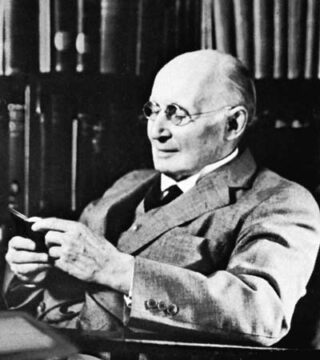by Scott Samuelson
But lo! men have become the tools of their tools. —Henry David Thoreau

The other day I was talking to some university students, and I asked them to what extent AI could be used to do their required coursework. Would it be possible for ChatGPT to graduate from their university? One of them piped up, “I’m pretty sure ChatGPT has already graduated from our university!” All chuckled darkly in agreement. It was disturbing.
Workers experience anxiety about the extent to which AI will make their jobs yet more precarious. Because students are relentlessly conditioned by our culture to see their education as a pathway to a job, they’re suffering an acute case of this anxiety. Are they taking on debt for jobs that won’t even exist by the time they graduate? Even if their chosen profession does hold on, will the knowledge and skills they’ve been required to learn be the exact chunk of the job that gets offloaded onto AI? Are they being asked to do tasks that AI can do so that they can be replaced by AI?
This crisis presents an opportunity to defend and even advance liberal arts education. It’s increasingly obvious to those who give any thought to the matter that students need to learn to think for themselves, not just jump through hoops that AI can jump through faster and better than they can. The trick is convincing administrators, parents, and students that the best way of getting an education in independent and creative thinking is through the study of robust subjects like literature, math, science, history, and philosophy.
But if we really face up to the implications of this crisis, I think that we need to do more than advocate for the value of the liberal arts as they now stand. The liberal arts have traditionally been what help us to think for ourselves rather than be tools of the powerful. We need a refreshed conception of the liberal arts to keep us from being tools of our tools. (More precisely, we need an education that keeps us from being tools of the people who control our tools even as they too are controlled by the tools.) To put the matter positively, we need an education for ardor and empowerment in thinking, making, and doing.
A big part of the problem is that our educational system, supercharged by helicopter parenting and a predatory economy, has drifted toward trying to make young people into tools. We’ve turned their untutored attentions over to the intentionally manipulative algorithms of big tech and then asked them to perform like AI in school. Now we’re shocked that they’re hooked on big tech and enlisting ChatGPT to do their homework.
Consider the study of literature. At least since No Child Left Behind, reading and language arts in the public schools have officially involved applying a technique of reading to excerpts of texts. Similarly, when students study literature at the collegiate level, they commonly learn how to apply theories to literature—to criticize it in the name of a discourse.
Most students who have gone through this system are now savagely distracted by their devices, decreasingly able to read a book, and understandably reluctant to study a subject that has little cultural capital and isn’t likely to recuperate their investments of time and money. If the point is to apply a technique or a theory to a bunch of words, AI can do a halfway decent job of “reading” textbooks and producing “readings” of literature. What’s the point anyway (students are apt to think), if there are plenty of good Netflix series to enjoy and discuss?
What I’m proposing as an alternative is an education centered on making students into engaged explorers of reality, both the reality within them and the reality around them.
First, their use of attention-sucking apps should be curtailed, if not banned. This is a difficult collective-action problem, but it’s increasingly pressing for any number of reasons. Let’s give young people a fighting chance to figure out how to use the miraculous gift of consciousness.
But it’s not simply about taking something away. It’s about giving them something better. If we stick with the example of literature, students should hear fairy tales, learn grammar, read stories, memorize poems, perform dramas, learn and translate from a foreign language, and all along be telling stories, writing poems, and giving speeches themselves. The pinnacle of their study of literature should not be a five-paragraph paper that conforms to the criteria of a rubric. It should be to read and write stories, poems, letters, and personal essays themselves.
The goal should be for them to see themselves as more than consumers or critics of others’ language, more than servants of others’ discourses. They should come to relate to language as a tool for fishing up the unexpected within themselves and illuminating the unexpected all around them. Though a chatbot can pump out for Christian a declaration of love for Roxane, it can’t actually find the words that will make her genuinely love him back.
What I’m getting at goes beyond the study of literature and can be applied to any discipline of the liberal arts, whether in the humanities or the sciences. The point should be less about backing into predictable answers than about being initiated into practices that make students into unpredictable practitioners of the subjects. Great teachers everywhere are engaged in this hard joyful work; unfortunately, it’s now often in direct opposition to the dictates of their institutions and our culture.
Let me be clear. I’m not making the progressive point that students should explore freely while ignoring the grammar and traditions of their subjects. If anything, I’m persuaded by the conservative point that there ought to be more emphasis on the mastery of generative forms and the exploration of deep traditions. But, setting aside for now the infighting of pedagogical approaches, the goal should be empowered activity in subjects that help us to have a more engaged relationship with reality.
I’m also not making the point that adults, or even upper-level students, should never use AI. In fact, I can see all sorts of wonderful uses for it—provided that its users can make wise independent judgments about what it’s generating. To form such judgments, students need an education that doesn’t at all mimic or rely on AI.
I think of the liberal arts as disciplines for freedom in three senses of the word “freedom.” First, they unlock the human personality. Second, they help us to think for ourselves. Third, they’re intrinsically choice worthy—not just good for some extraneous end.
Don’t arts, crafts, and sports meet these requirements as well as the humanities and the sciences? Pursuits like painting, cooking, or tennis (provided that they’re taught as initiations into practices and not simply as the following of steps) allow us to develop our style in them throughout our lives. They help us to be the kinds of people who think, make, and do for ourselves. And they’re the kinds of activities many of us willingly choose to do even if we don’t have to do them.

Sure, at one time cooking felt like a menial necessity that some were compelled to do so that others could pursue “higher” activities. Now even the poor—maybe especially the overworked poor—opt out of cooking to eat already prepared food. It’s people like me with a modicum of leisure who still get to cook our meals—an activity sometimes preferable to our “real” jobs. Moreover, though we contrast the liberal arts with technical education, what good is the distinction when our AI “slaves” can do our intellectual tasks even better than our manual tasks?
In some ways, what I’m suggesting about cultivating our free humanity hearkens back to very old forms of education. Think of how Confucius recommends for the development of our humanness the study of history, poetry, manners, and archery; or how medieval monks did their soul-work through the daily practice of a craft alongside their reading, writing, and praying.
But what I’m suggesting isn’t meant to be a throwback. I just want to preserve and even uplift our humanity in a world that is otherwise happy to make us anxious pawns. Sports have been narrowed and corrupted by their emphasis on elite athletics. The arts have been demoted to a fun little extra and then defunded. And knowledge-work has been offloaded onto the satisfaction of rubrics. If we want to get back to the ideal of a holistic education in doing, making, and knowing, then we need to figure out a way of teaching students how to embody these essential verbs.
While I understand that there are many thorny logistical questions raised by my proposals, I don’t see why the aim of all our educational institutions shouldn’t be to graduate students who all know meaningful things, make admirable things, and do interesting things. Though students would excel in some of these activities more than others, I’m quite confident that all young people are capable of having some degree of empowered independence in navigating and shaping the worlds within and around them. Why are our efforts and committees focused on frivolities like incorporating new technologies into the classroom rather than on priorities like getting students not to be tools of their tools? It should be all hands on deck for educating people to be answerable to the deepest needs of their minds, bodies, and talents.
I think that our fast-shifting economy as well as our liberal democracy would be better off with such people. More importantly, I know that all people would be better off with such an education.
***
Scott Samuelson holds a joint appointment at Iowa State University in Philosophy & Religious Studies and Extension & Outreach. He’s the author of three books: Rome as a Guide to the Good Life, Seven Ways of Looking at Pointless Suffering, and The Deepest Human Life—all published by the University of Chicago Press.
Enjoying the content on 3QD? Help keep us going by donating now.
